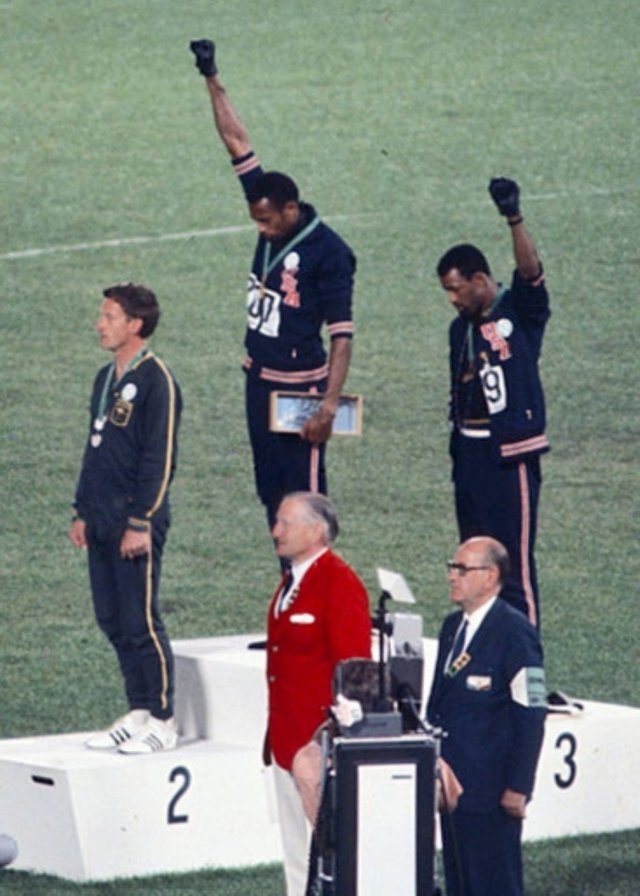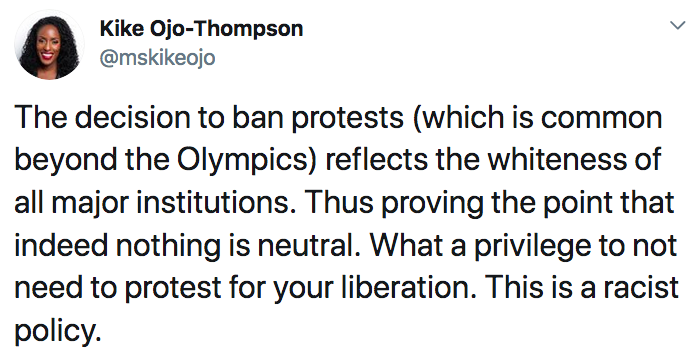A Boing Boing/Common Dreams Joint
The International Olympic Committee – long a swirling cesspool of corruption, censorship, and reputation-laundering for repressive regimes – has attained a new low, issuing guidance to athletes competing at the 2020 Tokyo Olympics that no political protests will be tolerated, specifically banning kneeling or raising fists.

Protests by Olympians – particularly Black Americans – have made political history, from the raised fists of John Carlos and Tommie Smith at the 1968 Mexico City Games (with Peter Norman standing in solidarity) to Jesse Owens’ thwarting of Hitler’s propaganda dreams for the 1936 Berlin Olympics.
“So the IOC is doubling down on the disgraceful treatment of athletes in 1968?” asked Sherrilyn Ifill, president and director-counsel of the NAACP Legal Defense and Educational Fund. The IOC expelled Smith and Carlos in 1968.

The update comes less than five months after the U.S. Olympic and Paralympic Committee reprimanded U.S. athletes Race Imboden and Gwen Berry for their act of protest at the medal podium. Imboden kneeled to protest “the multiple shortcomings of the country I hold so dear to my heart” including “a president who spreads hate,” and Berry protested social injustice in America.
The IOC announced the guidelines for Rule 50 of the Olympic Charter on Thursday. Among the specific actions (pdf) now banned:
* Displaying any political messaging, including signs or armbands
* Gestures of a political nature, like a hand gesture or kneeling
* Refusal to follow the Ceremonies protocol
“When an individual makes their grievances, however legitimate, more important than the feelings of their competitors and the competition itself, the unity and harmony as well as the celebration of sport and human accomplishment are diminished,” the guidelines read. The new rules still allow athletes to express their views on social media and in interviews and at press conferences, the new document states.
Failure to abide by the guidelines will result in the athlete’s action being evaluated by their “respective National Olympic Committee, International Federation, and the IOC, and disciplinary action will be taken on a case-by-case basis as necessary.”
Critics pointed to the fact that while the new document asserts that the podium and playing field must be a politics-free zone, the IOC itself is not politically neutral.
“The truth is, it’s not the mixing of politics and sports that [IOC president Thomas] Bach and the IOC don’t like,” Nancy Armour opined for USA Today. “It’s the mixing of politics they don’t like with sports.”
It’s just fine for Bach to lobby for the issues he finds important. Or to foster good relationships with world leaders who might someday bankrupt their economies in exchange for sparkling venues, five-star hotels, and Olympic traffic lanes that allow IOC members to avoid the general populace on the roads and in the airports.
But God forbid athletes should stay silent about racism, homophobia, inequality, or murderous regimes. You know, issues that have a direct effect on their lives.
That the types of protest now barred appear to take specific aim at black athletes wasn’t lost on other critics either.

Advocacy group People for the American Way rejected the new guidelines in a Twitter thread Friday that drew attention to an Op-Ed published at HuffPost in 2017 by Diallo Brooks, the group’s director of outreach and public engagement.
“The right to raise our voices, make a speech, march in a rally, or take a knee in protest – whether in front of a government building or a football field – is at the heart of what it means to live in a free country,” wrote Brooks.
“Young men of color who play sports are more than just entertainers, and they should not be penalized for speaking out peacefully against injustice,” he wrote. “They must be allowed to have a voice. And when their voices are threatened, we have to raise our own and stand with them.”
This work is licensed under a Creative Commons Attribution-Share Alike 3.0 License.
–
Comments welcome.
Posted on January 14, 2020


